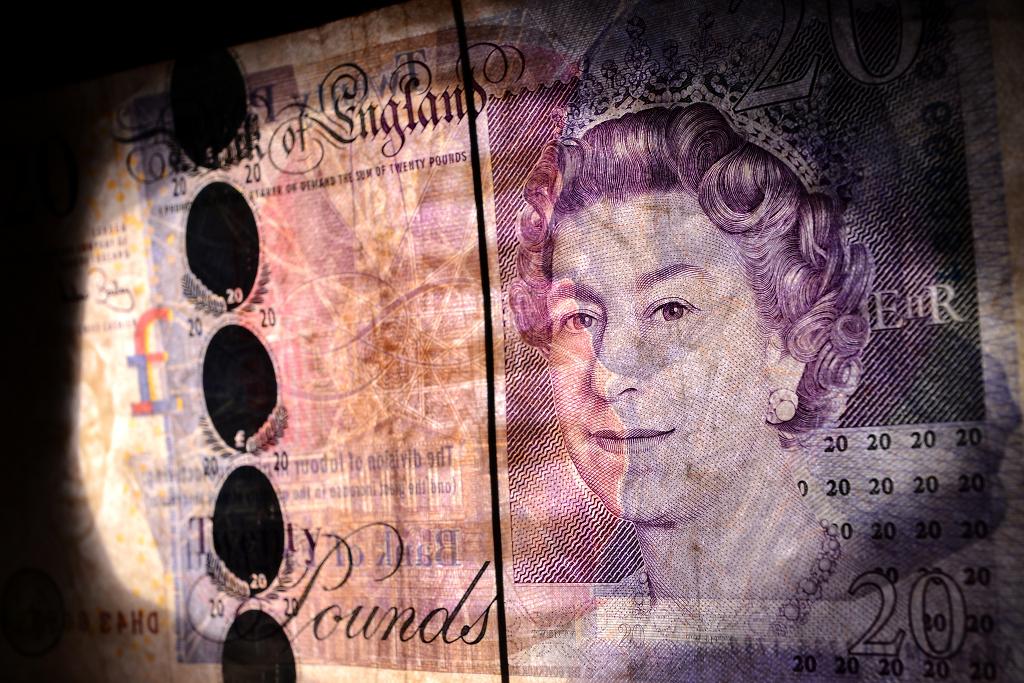Pound tumbles as UK heads for further quantitative easing
An illustrative picture backlit using a flashgun in London on Feb. 25, 2013 shows a British 20 pound bank note.
The pound fell below a key level against the dollar on Friday as worse-than-expected UK manufacturing data increased the likelihood of further quantitative easing (QE) by the Bank of England.
The pound dropped below 1.50 at around 3 p.m. London time before stabilizing to 1.5008.
The nearly 1 percent decline followed weak Purchasing Managers' Index (PMI) data for the manufacturing sector.
The PMI fell to 47.9 in February from 50.5 in January. That's the first reading below 50 since November. A reading below 50 signals a contraction, while a reading above 50 indicated an expansion. Economists polled by Reuters had forecast a rise to 51.0.
Coupled with this week's disappointing mortgage approvals numbers for January, the weak PMI numbers increase the possibility the Bank of England will vote to extend QE when it meets next Wednesday, said Steven Bryce, European economics analyst at Credit Suisse.
In a research note on Friday, Bryce added that the service sector PMI reading, due on Tuesday, will now be the main focus for policymakers.
"A weak number here could tip the Bank into a QE extension by 25 billion pounds [$38 billion] in our view," Bryce said.
Lee Hardman, currency analyst at Bank of Tokyo-Mitsubishi, told CNBC that markets had already substantially priced in the risk of more QE.
"1.50 is the next big support level and we think the downward trend will continue," Hardman said earlier in the day.
"It's a close call whether the Bank of England will expand its asset purchase program next week, but if they do, it would reinforce the downward momentum, but it wouldn't be a big surprise for markets."
The pound has already taken a hammering this week, falling to a two-and-a -half year low of $1.5073 against the dollar, after Moody's cut the U.K.'s credit rating last Friday.
Downward pressure on the pound from further QE could potentially make U.K. Gilts more attractive to investors. However, Bryce warned appetite for the safe haven asset could be waning.
"Purchases of Gilts by foreigners decreased this month to net purchases of 1.55 billion pounds, following purchases of 15.4 billion pounds last month," he said.
"This could suggest that a more 'risk-on' environment, combined with the depreciation of sterling, is eroding investors' appetite for Gilts."
Bryce added that roughly half of Gilts held outside the Bank of England are held by foreign entities, making the Gilt particularly vulnerable to foreign investor sentiment.
A 'Race to the Bottom'
Head of market analysis at Monex Europe, Eimear Daly, said that with Bank of England Governor Mervyn King in favor of more QE, further asset purchases are likely within three months, even if none are announced at the Monetary Policy Committee meeting next week.
Indeed, Daly said the Bank might "throw in its towel" with Japan and the U.S. and promise open-ended QE.
She warned that such a move could then be imitated by the European Central Bank as it attempts to devalue the euro, which is currently at an eight-month high against the dollar, a 16-month high against sterling and an 18-month high against the yen.
"Let the race to the bottom begin," Daly said.
More from our partner, CNBC:
CNBC: February Auto Sales Solid, Not Spectacular
CNBC: Obama Says 'Sequester' Crisis Is 'Just Dumb'
CNBC: US Consumer Debt Rises for First Time in Four Years
CNBC: Italian Unemployment Rate Hits 21-Year Record High
CNBC: Italy's Berlusconi Investigated in New Corruption Case
